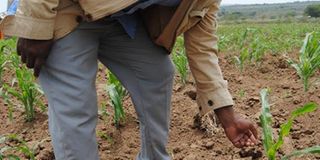High cost of inputs discouraging farmers from planting

The skyrocketing cost of farm inputs has raised pressure on farmers in Laikipia and Nyandarua counties ahead of the main planting season even as farmers grapple with dwindling returns.
Nation.Africa has established that the high costs have forced them to reduce the acreage under crops, putting the country’s food security at risk.
“From the seven acres I leased last year, I only harvested 111 bags of maize, each 90kg, down from the expected 150 bags. This season I have reduced them to four acres because achieving optimal production and good returns have proven unattainable,” said Mr Peter Mwangi, a farmer in the Marmanet area.
He said that high production costs, changing climate patterns, pests, diseases and poor markets have derailed maize production.
He said that producing a bag of maize costs farmers at least Sh2,000.
“I had to spend more money on a single bag of maize than what I got from the sale of the grain,” he said.
Ms Grace Wambui, another farmer, noted that she might be forced to plant crops without fertiliser because she could not afford it.
She said that the increase in fertiliser prices from Sh3,200 to Sh5,800 per 50kg was a big obstacle for the farmers.
“The cost of fertiliser and other operational costs are beyond my reach. This season I might opt to plant without fertiliser with my hopes of getting a bumper harvest this year dwindling,” she said.
The demand for fertilisers, said nominated MCA Irene Wacuka, has intensified because the sowing season for maize has begun.
“For farmers, selling two 90kg bags of maize at Sh2,800 per bag after spending Sh5,800 for a 50kg bag of fertilizer is a huge loss. Farmers have been visiting the National Cereals and Produce Board depot in Nyahururu with hopes of getting subsidized fertiliser in vain,” she said.
In Shamanei village, Mr James Mathenge, another farmer, told the Nation: “I have prepared my farm for planting and I am waiting for the rains. However, I might be forced to wait until the fertiliser prices drop or wait for the government to subsidize fertiliser to start planting.”
Ms Wanjiku Mwendia said that most farmers have quit farming activities and were engaging in other business ventures after the cost of production shot up.
“Farming was previously viewed as lucrative and profitable but the cost involved in the prices of fertilisers, pesticides and other inputs in the market is forcing people to seek opportunities in other sectors as returns from farming is not worth the toil the farmers go through,” she said.
Ms Mwendia called for policies that ensure farmers get decent earnings from their produce and are compensated when losses occur due to natural calamities or human activities.
“The Parliament needs to come up with a bill that will ensure farmers have minimum price support from the government. This will be a right for farmers to sell their produce at a set minimum price,” said the resident of Rumuruti.
She said the minimum support price will cushion farmers against price drops due to a glut.
The minimum price policy, she added, should also be extended to livestock farmers and they should be compensated for losses due to drought or theft.





